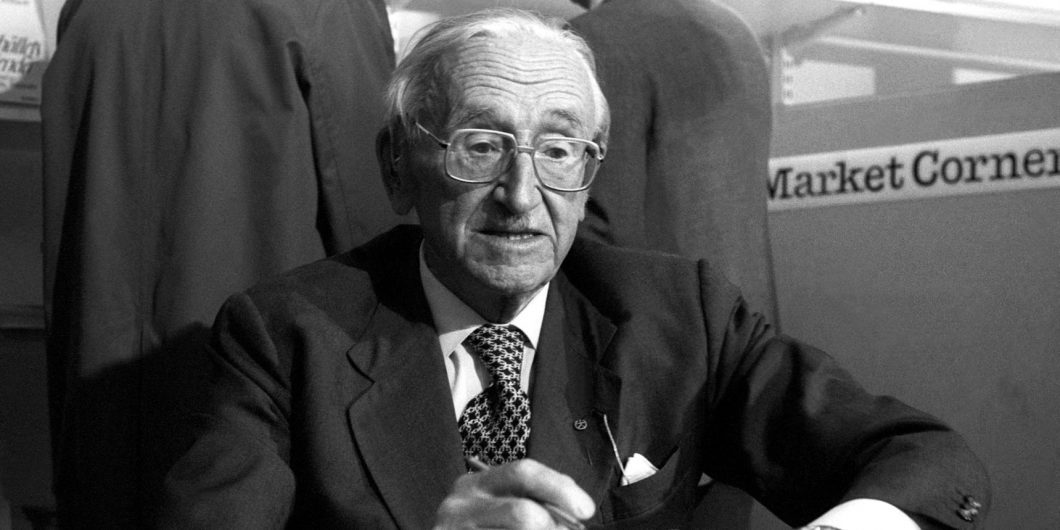A free and flourishing community usually doesn't require zoning.
Life in the Neoliberal Ruins?
Wendy Brown aims at neoliberalism in her new book, In the Ruins of Neoliberalism: The Rise of Antidemocratic Politics in the West, but it is conservative postliberals, such as Patrick Deneen’s Why Liberalism Failed, that her argument might engage more directly. Deneen and other conservative neo-traditionalists argue that liberalism (“neoliberalism” in Brown’s vocabulary) liquifies traditional morality in the name of autonomy. By contrast, Brown argues that neoliberalism’s doctrine of autonomy protects oppressive assertions of traditional morality that she would tear down in the name of democracy and equality.
Brown styles the distinctive contribution of her book’s radical criticism of neo-liberalism as identifying the underlying unity of neoliberalism and conservative neo-traditionalism. That conservative neoliberals and conservative neo-traditionalists are both pulling in the same direction would no doubt come as a surprise to both.
Brown’s argument has a number of moving parts. She takes as her primary intellectual foil Friedrich Hayek’s neoliberalism. She argues today’s populism is an unintended consequence of Hayekean neoliberalism. She makes much of Hayek’s dual emphasis on morality as well as markets. Hayek (and many others) argue that external liberty requires internal restraint. With these working together, the need for government intervention in life and markets is minimized. Brown takes issue with this, arguing Hayek’s legalistic conception of liberty results in the denial of the social and minimizes the true scope of the political in people’s lives. This in turn prevents democratizing and equalizing what is merely private life in Hayek’s view. Drawing on Marx and Foucault, however, Brown argues that private life, as it were, is the real fount of oppression in human life.
Her argument doesn’t end here, however. The privileging of this private life in turn creates effective autonomy in its most literal form, as in auto nomos, or self law, unhinged from others. This, combined with an all-encompassing instrumental rationality internalized from the market, results in nihilism and the reintroduction of brute force into politics, the opposite of what Hayek desired even as his views laid the ground for it.
It is a grand theory of the modern political Right, bringing together disparate streams into a single unity. Brown paints with too broad a brush, inventing a unity even those on the Right themselves do not see, and that in truth, does not exist.
I want to focus on just one part of Brown’s wide-ranging argument, her claim that neoliberalism’s denial of the social – its denial of society – and the consequent legalistic understanding of liberty or equality before the law is that which unites neoliberals and conservative traditionalists.
Ironically, however, it is Brown’s discussion of “the social” where today’s conservative neo-traditionalists would be most apt to agree with her. Brown nonetheless paints the denial of the social as generic to the modern American Right.
Drawing on lines of analysis advanced differently by Karl Marx and Michel Foucault, Brown argues that power relations are not limited to actions taken by the civil government. This view of the “political” as pertaining only to law and civil government misses much, if not most, of the most important political action.
Rather, in families, social organizations, work, the media, indeed, in the realms where most of us spend most of our time, according to Brown, is where power relationships are truly constructed. By regarding this social sphere as private or non-political, these critical power relationships, many of which are repressive, are given a free pass, and hence replicated rather than opposed.
In Brown’s dictionary, “social justice” therefore has adjectival bite. She sees these non-governmental power relationships and their creation nonetheless as truly political relationships. True democracy and equality cannot be created or sustained without going beyond mere legal requirements and importing their norms into the realm of the social.
Brown believes Hayek’s denial of social justice as a meaningful phrase to be far more than what it actually is. Hayek denies the adjectival bite of “social” in the phrase social justice. His purpose in doing so is to protect the social from political intrusion. Brown grants Hayek the purity of his motives, but she argues his move nonetheless brings the unintended consequence of ignoring the powerful political forces always at work in the social realm.
Brown takes Hayek’s denial of the social as generic to the modern Right. Here, however, today’s neo-traditionalists in fact overlap with Brown’s argument. Not on outcomes, to be sure – although neo-traditionalists may be on board with “equality” as an objective, provided it is understood as Aristotelian equality – but rather at her starting point that the social, too, is a domain of power.
It is here that today’s conservative neo-traditionalists are arguably at their most post-liberal if not anti-liberal. As with Brown, the neo-traditionalists reject the identification of the social realm with the realm of the “private.” This was a traditional hallmark of traditionalism as it lost battle after legal battle on speech and behavior to the domain of “privacy.”
The key turn in the arguments of today’s neo-traditionalists is their assertion that the old traditionalists lost because their arguments did not dig deep enough; their arguments were too American and, hence, too liberal. More broadly, however, is their insistence of the recovery of the Church and the family as public, even political, institutions. The neo-traditionalists do not mean to open up Church and family to subordination to the civil government. In important ways it is just the opposite. Nonetheless, these institutions do not dwell in the domain of the private. Consider, for example, Adrian Vermeule’s identification of the Church as a political institution, even if one of ecclesiastical rather than civil government. (Here and here.)
Conservative neo-traditionalists naturally deploy their recognition of power relationships in the social very differently than Brown. Nonetheless, this is notable move among conservatives more used to singing paeans to “voluntary organizations,” among which churches and families were normally included. (Oddly, given the age-old problem liberalism had with thinking about children.)
Conservatives neo-traditionalists, however, did not learn of power relations in the social from Marx, let alone Foucault. Implicit in the notion of “subsidiarity” as understood in Catholic social teaching is not a hierarchy in which the state delegates or defers to non-state entities, but recognizes the significance of non-state social organizations, particularly the family and the Church.
This insight is not limited to Catholicism. Drawing on Aristotle, for example, Martin Luther commonly discussed three “estates” or “hierarchies”: ecclesia (Church), oeconomia (household), and politia (political order). Each of these had separate, integral domains. Relatedly, Dutch Calvinist theologian – and one-time prime minister – Abraham Kuyper developed the vocabulary of “sphere sovereignty,” intentionally using political vocabulary to describe relations beyond the realm of civil government.
While not democratic, conservative neo-traditionalists nonetheless implicitly assert that recognition and proper formation of power relations in the social is a critical component of human flourishing.
I am unsure, however, that Hayek’s “denial of society” actually conflicts with those views. Again, his concern was to privilege actions in these spheres from subjection to the civil government, not to teach of the unreality of power in the social. Indeed, as Brown notes throughout her book, Hayek emphasizes the central importance of “morality” to sustain a free society. Brown sees this as a sinister combining of conservative moralism with neoliberal autonomy. Hayek sees it as setting out the necessary conditions for human flourishing.
And here we come full circle. Brown sees formalistic notions of liberty as the problem, as deterring the bringing of democracy and equality to the social. She sees liberty as the fundamental, and equality as the contingent.
In this, however, she gets the current problem exactly backwards. One of Tocqueville’s most important insights in Democracy in America is that it is equality, not liberty, that is the American idol. Americans will take liberty if they can have it with equality, but in a contest between liberty and equality, Americans will always opt for equality over liberty.
It is the logic of ideologized equality as I’ve suggested previously that accounts for the modern destruction of the social in the United States. Brown is exactly right on the reality of the social. Her cure, however, is to introduce more of the disease rather than the remedy.


